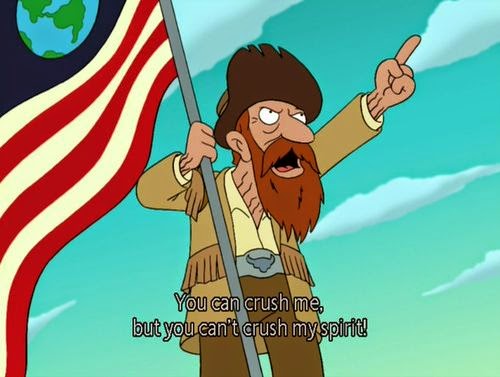
I’m in a depressive tailspin.
My work is making me mildly suicidal. My marriage is far too often thoroughly deflating. My weight makes me want to hide away. My habits are making me feel (rightly) like a failure, unable to make any improvements stick for more than a few hours. My sleep cycle is making me unbalanced. I probably have diabetes. My eyesight is failing, and if it’s diabetes, that’s terrifying, and if it’s not, then I don’t know why, and that’s… just sad. My brain is increasingly sluggish. My anger is through the roof sometimes. My location makes me very sad two thirds of the days of the year. My teeth are yellower than they should be and I’m not out there getting them fixed. I am already falling behind at my year’s goals. I haven’t even built the pull up machine to train on pull ups. I can’t even keep up with the trash service at my house.
Wow.
I fell on black days. My goodness, what an apt song.
But of course, I could know that this would be my fate. I can predict the future well enough to know that all of these things came from choices, perhaps other than Jin’s unexpected moyamoya and my job’s somewhat unexpectedly lame quality. But none of that is all that surprising! I know corporate software jobs tend to suck. I know corporate management sucks in cycles. I knew AWS was taking over middleware. I know that Indian hierarchy in American corporate workplaces produces suck! And I knew Jin had wonky genetics and a high chance of developing health problems in middle age.
Anyway, that’s not the key thing here. That’s not the future. That’s the past.
The key thing here is the future. I can also predict the future from this point.
If I continue in this depressive tailspin, I’m going to suffer a significant drop in my quality of life. Be it permanent health problems, be it significantly worse marriage or divorce, be the long term end of high paying employment opportunities, or even be it mental breakdown and self harm, I’m heading for the bottom.
This has got to stop! I’m 41! I’m not retired! I’m not dead! I’m not a grandfather! I’m young Harry Jones, I’m major Kevin Carlin, a man with ostensibly the energy to have like two more careers before I stop, and plenty of time to make lasting life changes.
Who do I want to be in my 40s? Do I want to be this guy, this miserable sack man? No! NO!
I want to be exactly who I’ve wanted to be for twenty fucking years, since I left math. I want to be the high energy, healthy Wizard of Happiness, who defies probability a little bit to make good things for the people who want them.
My goodness, that’s a distant goal.
But is it? Really? The ingredients are mostly there, hidden under a thick crust of bad habits. The health, the energy, those are missing. The happiness, that’s missing too.
But the skills, the unusual mix of skills. I have the skills. Goodness, do I have the skills.
Just thinking that makes me want to cry with a mixture of love and sadness. A big part of me is willing to receive that statement, that I have the skills, and a big part of me is even sadder to think of what a waste I’m making.
If there was one thing that would look different in that ideal life? It’s hard work. I would wake up and shoot out of bed and build things and build things and build things.
So why isn’t that happening? It’s in my nature to be that person! But it’s not happening because my version of “build and build and build” is subject to vicious and virtuous cycles.
In the vicious cycle, bad habits, pointless tasks, big distractions, emotional damage, and small failures are all mutually reinforcing, sending me straight down to zero and pinning me there.
In the virtuous cycle, good habits, good tasks, good scheduling, good emotional processing, and small victories are all mutually reinforcing, sending me towards flourishing.
Why aren’t the vicious and virtuous cycles at least balanced? The vicious cycle dominates over the course of my life.
Firstly, is the virtuous cycle inherently less stable? YES. “Happy families are all alike; every unhappy family is unhappy in its own way.” For each of those five components, absent any special effort, the probability of being on the virtuous side is certainly less than half.
Bad habits clearly dominate good habits. You live in a Dorito nation. If you were Chinese, you would live in a cigarette nation. Every nation is a drinking nation. It takes an effort not to live your preferred vices and bad character traits.
Pointless tasks clearly dominate good tasks. Fifteen years in the private sector have taught me that with effort and bravery, one might find a job with a lot of truly useful tasks in it, and without, one is almost guaranteed to find only jobs with only pointless tasks. This current job is a pointed reminder of that. I made an effort to select for a balanced workplace doing a form of work I understood that made a useful contribution to a larger project I value. Whewf. What I got is an unbalanced workplace doing a form of work I don’t understand that anyway does not make a useful contribution, even though I do still value the larger project.
Distractions dominate scheduling because life is messy and random, and scheduling is an artificial quality of order imposed on that life.
It’s not as clear that emotional damage need dominate good emotional processing. Probably if you look at all the family styles and all the personal habits of the world, there are more people giving and receiving net emotional damage than there are with healthy processing habits, but there are at least large stable pockets where healthy behavior is more the norm. I have lived in such a pocket, and I think relative to other people, I probably still do. In my own life, there are some factors that move this ratio in a bad direction: the disregulation of children leads to the dysregulation of parents, Jin’s family pumps a lot more emotional damage into the system than I’m used to, and I still have my experience of the 2010s leaving a sort of accreted dysregulation.
Small failures and small victories are mostly a matter of mindset, and maybe not really an independent dimension from the other four things. I admit it’s pretty darned easy, with the right perspective shifting tools, to live with either small failures or small victories as the dominant thing.
So, given those five factors, the virtuous cycle is inherently less stable than the vicious cycle.
But, is it also a personal matter? Do I make choices that prefer the vicious cycle over the virtuous cycle? YES.
Firstly, I do not put enough consistent effort into my good habits. This is true even in the good times. Habits require consistency, and I sabotage my good habits with a peppering of bad choices. It’s not that those choices add up. It’s that they short out the virtuous cycle. They’re like sprinkles of water on a fire.
Second, I am particularly inconsistent at scheduling. I believe in flexibility, and that is good up to a point, but, with a few exceptional good periods, for the most part, I do not respect my past choices or sufficiently allow them to determine my present. I tell myself I will do such and such a thing, but I have learned to give myself far too much permission to not do it when the time comes to do it.
Tasks are mostly not my fault. When I was working for myself, I learned that my task strategy was bad, that, absent extra discipline, I would ride in all different directions and accomplish less for it. But my tasks were not pointless. They were almost always clearly connected to a good outcome, and if I figured out that they weren’t helping, I would pivot. Being a parent and a corporate worker, I am not currently in control of the quality of the tasks. I suppose to the extent that I count lego city time as taking away from task time, that is a pointless task that’s in my control.
Emotional regulation is all me. Being a married person with two young kids is playing on hard mode, because the amount to regulate is high and the freedom to regulate any time anywhere is low, but in the end it’s still a pure choice. You take a bike ride or you veg on the couch, it’s *purely* your choice.
Small failures and small victories, to the extent that they’re a matter of perspective, simply require the use of that perspective. I get this one right at least as often as I get it wrong, and shifting it is the easiest. Like the mother at the end of Everything Everywhere All At Once, you see all the potentials in your head, and then you change the channel and look at the family that’s in front of you. My family has so far been notably absent from this essay, except as a source of stress!
But my family are a litany of small victories. I gently parented Clara through a sick day and resisted grandma’s urges to take her on an unnecessary hospital visit. I continue to build a very impressive resume of reading to Clara at night, stretching back to when she was two years old, being flexible and not forcing it on days that don’t fit our standard go down pattern, but rarely missing a day that does fit that pattern. I’m making a strong habit, and that’s not just a victory of parenting, it’s a victory of scheduling!
I continue to improve at regulating myself during fights with Jin, quickly catching my feelings once things have gone real bad. I’m pretty good at it, actually!
And this essay itself is a small victory. I can and should notice that my job work is still not getting done, like a pile of trash in the corner (and here you can see how it’s sometimes hard to have small victories without interacting with bad scheduling), but I also can and should notice that my mental health became very poor recently, and this morning I am directly addressing it. I am processing, dissecting, and improving my mental health by writing. This really needed doing, it was time, and I did it.
Finally, the essay is also a small victory in another category. My only high priority goal this year is to fix my physical health. My only low priority goal this year is to write one hundred thousand words. When I wrote that goal, I sort of meant fiction, but I also like and benefit from essay writing. It’s genuinely not easy to be generous to myself (because I rightly worry I’ll be too generous), but if I am generous enough to allow a little bit of essay writing as the minority contribution to that 100k total, then this essay counts for a considerable amount, and that is a small victory indeed.
So, what have I done so far today?
I have admitted what’s going wrong. I have reminded myself of how I’d like things to be. I have separated one significant thing out of the list, namely the habit to get up and build build build build. I have reminded myself that it’s in my nature to do that. I have found that it doesn’t always happen because of vicious and virtuous cycles. I have dissected those cycles into five components, and I have investigated the degree to which each of those components is or is not on me.
Having done so, I notice there is a single action running through all of the cycle components, both in the structural section and in the personal section: the choice to make effort.
Everywhere, in every component, regardless of the structural difficulty of the situation, there is always a choice to make effort which will improve things in mutually reinforcing ways, and a choice not to make effort which will worsen things in mutually reinforcing ways. Regardless of where I am in the cycle, regardless of where anyone is in such a cycle, the choice to make effort will improve things.
I am not lazy. I wrote a two thousand word essay this morning and directly confronted some things about myself. That took effort. But my habit of making the choice to make effort is bizarre and messed up. Jordan Howlett said Pitbull said Paolo Coelho said “stress, anxiety and depression all occur when we try to live to please other people”. My power to make the choice to make effort isn’t gone, at all. It’s just really messed up because I’ve got my life direction and priorities all out of sorts, and I don’t have good connections between the efforts of the day and the north star of my life. Pointless tasks leading to small failures, instead of good tasks leading to small victories, yeah?
So, the medicine for me is not to try to discover or build my ability choose-effort power. It’s not to force the choose-effort power in particular directions.
It is to align. Why are today’s choices to effort the right choices? Understand, care, and make them. Or, if they’re not, discard them. Never think of them again.
I will begin again the work of aligning my choices today.







.jpg)
